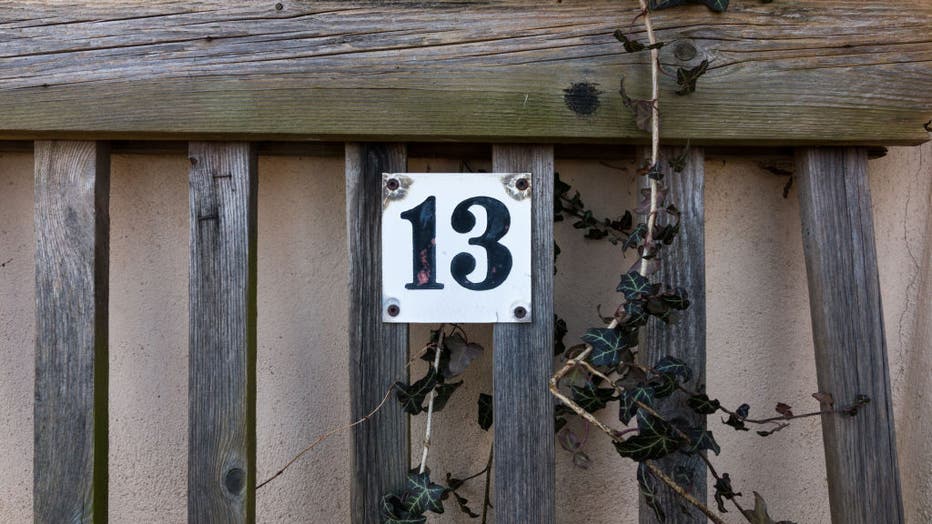Friday the 13th origins: A look at why the day is considered unlucky

FILE - A page of a calendar that reads 'Friday 13th' falls to the ground in Berlin, Germany, in a file image dated June 13, 2014. (Photo by Soeren Stache/picture alliance via Getty Images)
May 13 marks the one and only Friday the 13th of 2022. The last occurred in August 2021, and the next won’t come until January 2023.
The day has long evoked a range of emotions for those who are superstitious.
Similar to walking under a ladder or breaking a mirror, many believe that Friday the 13th brings bad luck — to the point of inspiring a horror movie franchise and even a late 19th-century secret society.
Here’s a look at its possible origins:
Why is Friday the 13th considered unlucky?
It remains unclear when negative superstitions began swirling around Friday the 13th. But while the number 12 has generally been associated with completeness — 12 months of the year, 12 days of Christmas, 12 zodiac signs — the number 13, specifically, has long been associated with bad luck.
The ancient Code of Hammurabi, one of the earliest and most complete written legal codes, reportedly omitted a 13th law from its list of legal rules, according to History.com. Though this was likely a clerical error, superstitious people sometimes point to this as proof of the number’s negative associations.
In Western lore, experts believe the fear over 13 started in the Bible. Thirteen guests attended the Last Supper, including Jesus and his 12 apostles — one of whom, Judas, betrayed him. The next day was Good Friday, the day of Jesus’ crucifixion. The Last Supper seating arrangement is believed to have created a Christian superstition that having 13 guests at a table was a bad omen, according to the site.
Regarding the day of Friday, the negative connotation may also have roots in Christianity, History.com explains. Jesus was crucified on a Friday. Some believe Friday was the day Eve gave Adam the forbidden fruit from the Tree of Knowledge and the day that Cain killed his brother, Abel, according to the website.
Fear of Friday the 13th
Some who fear Friday the 13th suffer from friggatriskaidekaphobia — described as having a "morbid, intense, excessive and irrational fear" of the day, according to allaboutcounseling.com, a site providing information on counseling and social issues.
The Stress Management Center and Phobia Institute estimates that between 17 and 21 million Americans suffer from this phobia.

FILE - The number 13 is shown on a park bench in a file image taken on March 1, 2018, in Gera, Germany. (Photo by Stephan Schulz/picture alliance via Getty Images)
The exclusive Thirteen Club
In the late-19th century, a New Yorker named Captain William Fowler sought to remove the stigma surrounding the number 13 by founding an exclusive society called the Thirteen Club, according to the History Channel.
The group dined on the 13th day of the month in room 13 of the Knickerbocker Cottage, which he owned and later sold on Friday, April 13, 1883.
According to History.com, several former U.S. presidents — Chester A. Arthur, Grover Cleveland, Benjamin Harrison and Theodore Roosevelt — were members at one point or another.
Skipping the number 13
Many people also suffer from triskaidekaphobia, defined as the irrational fear of the number 13. Airlines such as Air France often don’t have a 13th row, and many buildings in the U.S. don’t have a 13th floor.
Experts say that it’s an economic decision — as customers would not spend money on something they thought was cursed.
The number 13 around the world
In Asia, 13 is just another number. And in China, it’s the number 4 that provokes the most fear — as the pronunciation of the word for the number four is similar to that of the Chinese word for death," according to National Geographic. The phenomenon is known technically as "tetraphobia."
The number 8 is particularly lucky in China and Japan because it sounds similar to "prosperity" or "wealth."
In Greece, Mexico and Spain, Tuesday the 13th is thought to be cursed.
The Associated Press contributed to this story. It was reported from Cincinnati.
Editor’s note: A version of this article was originally published on Nov. 13, 2020.

